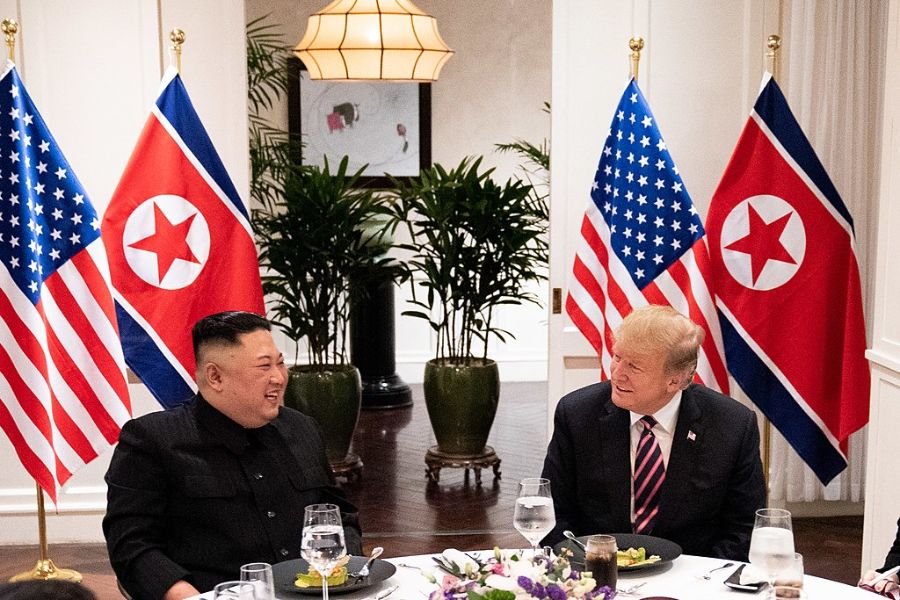Victor Cha, one of the most well-known American scholars on North Korea, has recently warned about President Trump’s potentially very bad North Korea deal in his Foreign Affairs article.
I must make it clear at the outset that I agree with the author’s main point in principle. However, I disagree with his rationale. While very well-intentioned, the article suffers from several problems. Most notably, it claims that North Korea’s top policy with regards to United States is to force United States to accept that North Korea is a nuclear weapons state, a view which warrants more cautious analysis. In addition, the article claims that North Korea’s denuclearization should be the premise of negotiations, a view which underestimates North Korea’s strategy. I suggest that North Korea’s priority is not de facto acceptance regarding its nuclear status, but something else. I also argue that, in order to discuss denuclearization, one needs to understand why nuclear weapons are of utmost importance to North Korea.
What North Korea Wants
The article claims, “What Pyongyang truly craves from Washington is de facto acceptance that North Korea is a nuclear weapons state. Even though this would not provide material benefits, it is arguably more important for Pyongyang.”
First, for North Korea, a nuclear program is not the goal itself, but the means of survival. This is why North Korea has agreed to denuclearize several times in the past. Regarding the 1994 Agreed Framework, North Korea agreed to halt its nuclear program, provided that, “The two sides will move toward full normalization of political and economic relations.” At the Six-Party Talks on Sept. 19, 2005, North Korea stated that it would be committed to abandoning nuclear weapons, as well as returning to the Treaty on the Non-Proliferation of Nuclear Weapons, and to the International Atomic Energy Agency safeguards. In response, United States affirmed that it “has no intention to attack or invade the DPRK [Democratic People’s Republic of Korea, or North Korea] with nuclear or conventional weapons.” North Korea’s stance has been almost consistent. At the 2018 summit between United States and North Korea, Chairman Kim Jong-un “reaffirmed his firm and unwavering commitment to complete denuclearization” under the condition that President Trump provides security guarantees to North Korea for peace and prosperity. If North Korea’s priority was the nuclear weapons program itself, the country would not have participated in negotiations in the first place, nor would it have agreed to denuclearize.
Second, related to this, North Korea’s priority has been its survival, not nuclear weapons. This term “survival” refers to more than just the continuation of the regime. It also implies sustained economic development and prosperity in general. That is why North Korea has consistently tried to engineer economic development, despite its dysfunctional and inefficient economic system. Chan Young Bang, an esteemed expert on North Korea and economist, has conducted extensive research on the economy and socialism of North Korea, repeatedly demonstrating that its economic system is unsustainable. Apart from that, North Korea experienced an existential crisis in the mid-1990s, the Arduous March, which was marked by widespread famine and severe natural disasters. More fundamentally, because of the ongoing Korean War, which began in 1950 and ended with a ceasefire only in 1953, from North Korea’s point of view, it has been constantly threatened by South Korea and United States. South Korea, with an economy 60 times larger than North Korea’s and the fifth-strongest military in the world, has often expressed its intention of absorbing its Northern neighbor in the past, while United States maintains 28,500 troops in South Korea. It even deployed nuclear weapons to South Korea for 33 years, from 1958 to 1991. North Korea’s nuclear policy represents the country’s decisive strategy for addressing its security and economic crisis that threaten the regime’s survival.
Third, one of Chairman Kim’s core missions has been to improve North Korea’s economic situation and its people’s living standards. In his very first speech on 15 April 2012, he declared that “it is our Party’s firm determination to ensure that our people never have to tighten their belts again and enjoy the prosperity and wealth of socialism to their heart’s content.” On March 13, 2013, Chairman Kim launched the byungjin policy, which pursued economic development and nuclear weapons simultaneously. It is important to recognize that Chairman Kim put economic development first when he announced his signature policy. Moreover, in his New Year’s address on Jan. 1, 2019, Chairman Kim employed the term “economy” 38 times, while he referred to nuclear programs just two times: “complete denuclearization” and “we will no longer make, test, use, proliferate nuclear weapons.” Of course, whether North Korea has actually improved its economic situation is a different matter.
Taken together, Chairman Kim might be thinking about choosing between economic development and nuclear weapons. In other words, North Korea does pursue “material benefits.”
What Victor Cha Wants
The article claims, “Even in the Six Party talks almost two decades ago, where I served on US delegation, North Korean interlocutors rejected denuclearization as the premise of negotiations.”
From my point of view, it would not make much sense to blame North Korea for rejecting “denuclearization as the premise of negotiations.” Denuclearization would need to be a result of negotiations rather than the premise. I am not suggesting that denuclearization is unimportant. A fundamental problem is that the author fails to understand why nuclear weapons are important for North Korea. The country’s nuclear program has three key features: military (a powerful deterrent and spearhead for countering military imbalance), political (a key source of legitimacy and vital part of Chairman Kim’s byungjin policy), and international values (a means to pursue a hostile foreign policy and decisive bargaining chip). Only when these functions are adequately compensated for would the country be in a position to consider denuclearization. It would be a strategic miscalculation to push North Korea to simply accept denuclearization as the premise of negotiations.
What Others Want
The article claims, “this new context makes reengaging with North Korea along old lines effectively pointless. Past efforts, such as the 1994 Agreed Framework […] Six Party Talks in 2005 […] won’t serve as guidebooks now [under the Trump administration].”
This proposition disregards the fact that Chairman Kim, as noted above, at his summit meeting with U.S. President Trump in 2018, “reaffirmed his firm and unwavering commitment to complete denuclearization,” provided that “President Trump committed to provide security guarantees to the DPRK […] for peace and prosperity.” North Korea at the time also had “more cards and more leverage” than in 1994 and 2005. In addition, the author failed to mention that North Korea, at the inter-Korean summit in 2018, “confirmed the common goal of realizing, through complete denuclearization, a nuclear-free Korean peninsula.” Further, South Korea “shared the view that the measures being initiated by the north side are very meaningful and crucial for the denuclearization.” In other words, the article presents certain events selectively to support its claim, rather than exploring the whole picture of the matter.
To be fair, the article points out that North Korea “is in a rather different place now than it was in 2018” in the sense that a) it enjoys a strong bond with Russia, and b) it is emboldened by the alignment among Russia, China, and Iran to undermine global order. But the argument is not logically sound or strong, as these have been the case even before 2018.
While I diverge on the article’s rationale, there are several important points that I converge. For instance, the article states, “Kim makes decisions based not on mutual trust but on cold calculations of self-interest.”
I agree. Chairman Kim is a rational actor. Against ideologically-charged perceptions or biases, Chairman Kim appears capable of conducting a cost-benefit analysis based on his “cold calculations of self-interest.” According to David W. Shin, a dominant approach to North Korea would take Chairman Kim as mad, crazy, and irrational. Taking this framework, a review article on a book about North Korea states that it is “flawed how the author repeatedly characterizes Kim Jong Un as a rational politician.” However, it is worth noting that there are different lines of inquiry that describe Chairman Kim as rational. This includes an assessment by a high-ranking U.S. Central Intelligence Agency official, which was delivered at a conference at George Washington University. It aligns with Hazel Smith’s thought-provoking work offering a critique of the so-called securitization framework regarding North Korea that is “old fashioned in its reliance upon the use and potential of military force as the central analytical notion in foreign policy behavior.” Smith strongly urges that North Korea should be taken as a rational actor.
I also agree with the point about US strategy of maximum pressure: “Nor will just relying on maximum pressure work. Squeezing North Korea’s economy […] has been made impossible by Russia’s and China’s noncompliance with international sanctions.” More broadly, United States-led sanctions and various measures of pressures, threats or sticks have failed to achieve their objectives. These measures could not stop North Korea from acquiring and advancing its nuclear weapons. Indeed, there are experts who share this view: the author of this article Victor D. Cha, Leon V. Sigal, Jiawen Chen, and Frank Aum, among others.
In addition, the article timely addresses “the Pentagon’s purported plans to direct U.S. forces in Korea away from peninsula deterrence and toward defending Taiwan.” China’s core objectives include maintaining peace and stability on the Korean Peninsula and unifying with Taiwan. Elbridge A. Colby, the current Under Secretary of Defense for Policy and former Deputy Assistant Secretary of Defense for Strategy, believes that US military resources “should be directed toward planning for a conflict with China over Taiwan.” He explicitly states that “I’m in favor of reshaping US forces in the ROK to focus on China.” That is, United States could block China’s attempt through its forces stationed in South Korea (and Japan). Or it could indirectly tackle Chinese unification by actively encouraging its allies to intervene. In this context, North Korea’s nuclear program does not serve China’s strategic interests. China would be willing to participate in negotiations about North Korea’s denuclearization.
What I Want
Donald Trump’s return to the White House has shaken up the global approach United States. The rules-based international order, common sense to other countries but nonsense to President Trump, has become an American-based international disorder. It might now be the time to witness the end of the long American century. This geopolitical upheaval also applies to North Korea. Its possible impact is so profound that
Victor Cha is a great scholar and I admire his work and experience. This is not lip service. I mean it. That is why I look forward to his response, deeply.
[Photo by The White House from Washington, DC, Public domain, via Wikimedia Commons]
The views and opinions expressed in this article are those of the author.

Dr Sungju Park-Kang is Research Fellow at the DPRK Strategic Research Center, Assistant Professor of International Relations, and Founder of Kang Scholarship at KIMEP University, where he is also acting as President’s discussion partner. In addition, Park-Kang is Adjunct Professor at the Centre for East Asian Studies, University of Turku, Finland. He was formerly Assistant Professor of Korean Studies and International Relations at Leiden University, the Netherlands and the University of Central Lancashire, UK. His work has appeared in Review of International Studies, Millennium: Journal of International Studies, Asia Europe Journal, Polity and The Geopolitics, among others. Park-Kang is the author of Tears of Theory: International Relations as Storytelling and Fictional International Relations: Gender, Pain and Truth.

